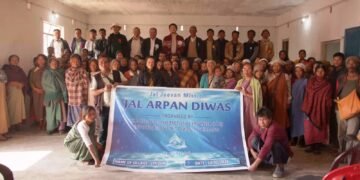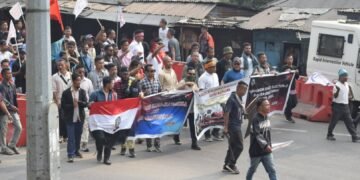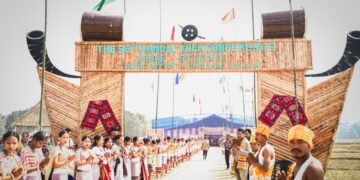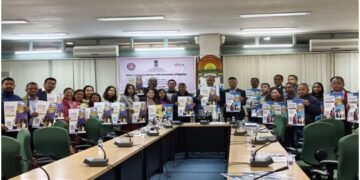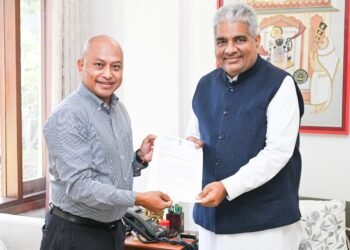By Gregory F Shullai
The Khasi (including the Jaintia) do not represent progress towards a better, stronger or higher society in the sense in which this is supposed to occur today. That progressiveness that once was ours is clearly missing but still we call it progress. Progress to what? Our progress is a total misconception and we deceive ourselves when we still think so highly of ourselves. In short, we may have been what we think we were but what we have become is certainly something different, something less -something which we cannot rid ourselves of now. This affirmation arises from numerous observations in our social lives in a State that was essentially created by us, and in spite of us having a greater number of representatives in the Legislative Assembly, our kindly Christian mindset actually provided a reservation to another community less capable than ourselves. Gone are the days when a Khasi was the natural choice for the leader of the State. Any Khasi who would be bold enough to acknowledge with pride that a Khasi is better than their neighbour will find himself in the midst of the greatest controversy and a storm of contradictions would arise; so, let us proceed with great caution in analyzing the change the Khasi has gone through, because the original Khasi would never have settled for this.
There can be no doubt today that the Khasi are a mingling of a number of races but that is not the problem; something else is. In every sense of the term the Khasi are more intangible, more contradictory, more incalculable and even more surprising to themselves than other races are to them. I will not elaborate on this assumption but anyone interested in affirming the matter need only check out Google. To be frank, in the present-day context, I think we cannot put a definition to who is or who is not a Khasi except by using the cultural distinction that they are born of a Khasi mother and adopt the mothers’ clan name (matrilineal) and regard themselves as the originators and the keepers of these socio anthropological practices, and because of which they have a uniqueness which separates them from the mainstream Indian and this they use whenever there is any attempt to amalgamate them into the national mainstream…by way of the UCC.
It has become characteristic of us to keep the question, “who is a Khasi?” alive – and never let go of it. It is by virtue of this matrilineal characteristic that the Khasi retains some autonomy and identity regardless of what others may think of them. Surprisingly in the midst of all this argument and counter argument, religion is absolutely of no consequence in the matter – but, is it? We will proceed carefully on this aspect as one religious group constitutes the majority and its precepts have a bearing on what the Khasi has become and is becoming. So far, the impact of religion has been successfully kept out of the analysis on who a Khasi is. In the course of the following paragraphs, we will try to examine the role that religion has played in making or unmaking us as the case may be. But firstly, I will confess that the observations which produced these disturbing feelings were essentially personal…not my friends and associates.
Determining the identity of the Khasi from their religion is no longer relevant. If one vivisects the Khasi soul, which no doubt is manifold and superimposed by other factors by now, one will invariably discover that it really played a minimal role in the life of the original Khasi, but all that has apparently changed, the soul now plays a more important role because the bulk of the Khasis are Christians and the Christian idea of the soul is not similar to the Seng Khasi (the keepers of the Khasi traditions and beliefs) idea of the soul. The Christian soul has a distinct purpose and character, its young and aged, ripe but still to reach its full maturity, orthodox but flexible, as can be contended in the different Christian denominations and the common commandment “Thou shalt love thy God with all thy soul.” Contrastingly, the Seng Khasi do not see the soul as separate from the body and believe that on death the body (with the soul) will be a ‘guest at the gates of the Creator’ i.e. every soul retains the style of the person it possessed. Because of this variation in one’s belief, things have gotten mixed up but no one wants to go about analyzing what this portends. As to what has gotten mixed up in the soul would be a bad guess to make but most certainly plenty. With the coming of Christianity, our virtues are necessarily determined, or even stimulated, by our weaknesses (Sermon on the Mount) whereas to the Seng Khasi it is our strength.
I have not read any thesis on this aspect, and therefore I am left asking more questions than settling for an answer on the matter. These days, authors and scholars prefer to keep an astute silence on the role religion played in moulding the modern-day Khasi and they probably have good reason for doing so as it appears the Khasi is still becoming religiously definable – not yet fully developed into a distinguishable type, but since globally religion is adopted to distinguish people, the time is coming when religion will define who a Khasi is. As it stands now, identifying a Khasi from his religious practices is impossible – our original religious practices do not distinguish us as a race, and perhaps that is why Christianity and Islam and the RSS and other groups easily infiltrate the Seng Khasi by introducing their doctrines into the Khasi belief system. The Khasi has been educated to worship on Sundays, abstain from pork, abstain from beef and these abstentions are recognized as virtuous, with every convert lending every other convert a helping hand: somewhat akin, to where everybody is either an invalid or an invalids’ attendant. This different lifestyle is deemed virtuous – that is to say more meaningful, more prodigal and an even more abundant sort of life without giving the convert any practical benefit by being different. And that is our problem.
Christians constitute about 70% of the States’ population. To do justice to the changes that have come to the Khasis by way of Christianity is a humongous exercise but we will stick to one aspect alone in this document – arriving at a more honest depiction of what it has brought about morally, we have to approach the subject with a mature circumspect capable of tolerating the pain of being who we are as if being who we are is a serious open wound. The first question, “What is the problem we are faced with by being a Christian Khasi?” Remember Christianity is all about the soul; it does not follow the path of the flesh: “dust to dust ashes to ashes” as compared to the Seng Khasi’s belief that on death we will be guests at the gates of the Creator. It’s a difficult exercise no doubt; but when has anything meaningful come from an easy armchair? Physically and morally, we have become a decadent race, no longer the proud nationalistic individuals we considered ourselves to be in the days of Kiang Nangbah or Tirot Sing.
Now, assuming that we are prepared to see ourselves as soul, the following paragraphs may hurt and harm. We will need to be cheerful even while we mock our nature or at least our nature as others see it in us. We will require to be capable of being casual, and laugh jokingly at the things we say about ourselves which in all honesty are the truth of who we really are. After all, does anyone doubt that we can actually say with a straight face the worse things about ourselves? Impossible! Everything factual in such matters would be held back because that is how much we love ourselves, but if we can laugh while reading, we will actually be coming out with the truth and that would be the best revelation for the race going into the future – to be sure, we will attack the entire race which has become so different from what it once was.
We will start by asking ourselves the question, have we become more moral? As might be expected we have dwarfed ourselves with ferocity in so far as actual Khasi morality is concerned…and stunted as we might be in our new morality, we still believe we are better than our neighbour. Right? We justify our lack of action in the present, with the tongue in cheek statement that there are no burning issues that the Khasis are facing now, when a drive to Police Bazar after 10pm, and the evidences from local policing by the Dorbar in the localities paint a total degeneration of our moral values. We modern men and women, so extremely delicate and susceptible, full of consideration one for the other, actually dare to suppose that the pampering fellow feeling which we all display by prayer and faith marks a definite step forward and shows us to be far ahead of the men of olden days. Wrong! I doubt if we can even imagine ourselves doing what our ancestors did…our nerves could not endure that reality, not to speak of our muscles.
This inability to do what is needed to be done, does not denote any progress. We have to admit the truth, we have become weak, delicate, and susceptible. Beef ban didn’t excite us into demonstrating our anger even if the ban was of no consequence, that our lands are being infiltrated by non-Khasis hasn’t raised a hue and cry, that we are now being dictated by what the soul regards as correct and not the body, is nothing less than losing of our centre of gravity. We are more concerned with our soul than with our body. The Khasi never knew about morality as a thing of the soul because morality was a matter of the body. We have been deflected from caring about how we behave and are more concerned with saving the soul – we have become a race that doesn’t give a damn for the body.




